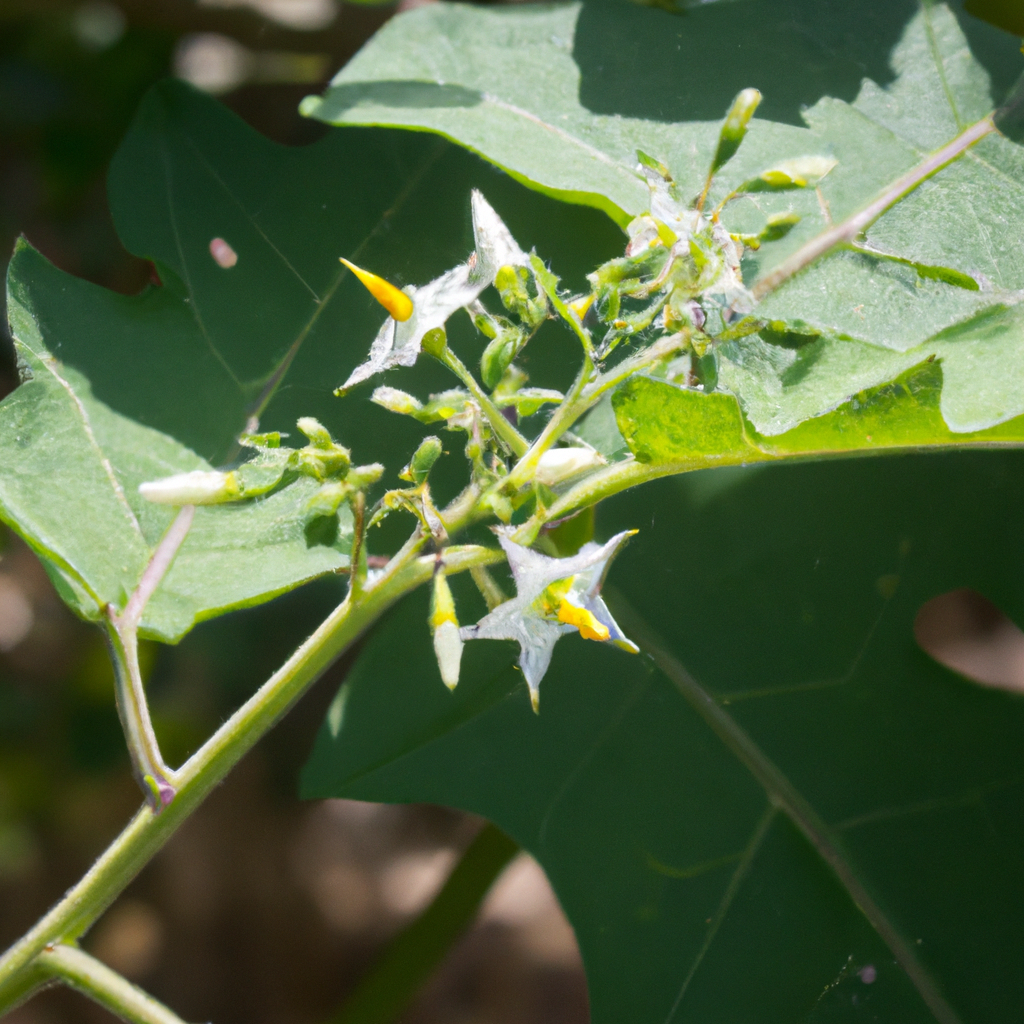Biological Name:
Solanum torvum (Turkey-Berry)
Natural Habitat:
Turkey-Berry: This plant is native to tropical regions of the world, and it can grow in a variety of habitats, including forests, fields, and disturbed areas.
Description:
Turkey-Berry also known as Solanum is a plant that is native to grassland and prairie regions of North America. It is an annual herb that can grow up to six feet tall and it has small oval-shaped leaves and small white or purple flowers that bloom in the summer. The plant is known for its toxic berry-like fruit which is not edible and can be harmful to grazing animals.
Frequently Asked Questions (FAQs)
Q: What does turkey berry taste like?
A: The ripe berries have an intrinsically piquant, bitter taste. The other common names of turkey berry are wild eggplant, prickly nightshade, shoo shoo bush, susumber, devil’s fig and pea eggplant.
Source
Q: What does Turkey berries do to the body?
A: Turkey berries contain many antioxidants like alkaloids, tannins, glycosides, flavonoids, torvosides, and saponins, which can be very effective against cardiovascular diseases, cancer, and stroke. The dried and powdered berry also helps reduce blood pressure, which can be a risk factor for heart diseases.
Source
Q: Does turkey berry increase blood pressure?
A: May help lower blood pressure Early research suggests that compounds in turkey berry may serve as a natural way to lower blood pressure.
Source
Q: Is turkey berry a fruit?
A: Turkey berry is a small green fruit of the tropics. These berries grow on bristly bushes that can overrun farmlands and pastures or displace native plants.
Source
Q: How do you clean turkey berries?
A: Harvest matured turkey berries. … Partially crush the berries. … Wash with clean water to remove seeds and clean the berries. … Separate the seeds from the berries. … Wash the berries finally with a mixture of lemon juice and water.Blot the berries on a clean cotton cloth (this will absorb some of the moisture).
Source
Q: Does turkey berry have thorns?
A: Turkey berry can rapidly overtop most herbs, grasses and other shrubs but cannot survive under a closed forest canopy. The vicious spines on the stem and small prickles on the leaves, inhibit the free movement of people, livestock and wildlife.
Source
Q: Can Turkey berries be eaten raw?
A: In turkey berry preparation prior to consumption, it could be dried as used in sundakkai (an Indian food) or cooked fresh as well as eaten raw.
Source
Q: What are the side effects of turkey berry?
A: Key Takeaways. Turkey berry is an entirely edible plant that you can eat from its roots to its berries. It helps manage diabetes, lower blood pressure, treat anemia, and prevent chemotherapy side effects. Consuming turkey berry in excess may cause nausea and dizziness.
Source
Q: What is another name for turkey berry?
A: Tagged as Solanum torvum, this berry is also called as shoo shoo bush, prickly nightshade or the devil’s fig.
Source
Q: Is turkey berry good for liver?
A: Turkey berry protects your liver and kidneys Turkey berry could be an excellent solution for protecting your kidney and liver from harmful chemicals. A study on rats indicates that turkey berry may alleviate kidney and liver damage by modulating oxidative stress (6).
Source
Q: Is turkey berry good for diabetics?
A: The berry is also said to be an anti-inflammatory and an analgesic for stomach problems and for the control of diabetes.
Source
Q: What is the benefits of Turkey berries?
A: Turkey berries contain many antioxidants like alkaloids, tannins, glycosides, flavonoids, torvosides, and saponins, which can be very effective against cardiovascular diseases, cancer, and stroke. The dried and powdered berry also helps reduce blood pressure, which can be a risk factor for heart diseases.
Source
Q: What berry lowers blood sugar?
A: Dad jokes aside, foods like blueberries provide fiber and antioxidants known to lower blood sugar and inflammation. Similarly, one study found strawberries reduced diabetes complications like kidney disease and nerve damage.
Source
Q: Which berry is best for diabetics?
A: Blueberries and diabetes In fact, the American Diabetes Association (ADA) calls blueberries a diabetes superfood. While there’s no technical definition of the term “superfood,†blueberries are packed with vitamins, antioxidants, minerals, and fiber that promote overall health. They may also help prevent disease.
Source
Q: What fruits to avoid if you are diabetic?
A: apples.apricots.avocados.bananas.blackberries.blueberries.cantaloupes.cherries.
Source
Q: Why it is called turkey berry?
A: Etymology. “From the fact that these berries are much eaten by turkeys.”””
Source
Q: What is the benefit of turkey berry?
A: Turkey berry is a particularly rich source of plant-based iron and often consumed to treat or prevent iron deficiency anemia. Although turkey berry possesses a high concentration of iron, recent animal research indicates that it may not be well absorbed in the digestive tract.
Source
Q: What are Turkey berries good for?
A: Turkey berries contain many antioxidants like alkaloids, tannins, glycosides, flavonoids, torvosides, and saponins, which can be very effective against cardiovascular diseases, cancer, and stroke. The dried and powdered berry also helps reduce blood pressure, which can be a risk factor for heart diseases.
Source
Q: Is turkey berry good for ulcer?
A: Consuming Turkey berry keeps many intestinal problems like indigestion, diarrhoea and gastric ulcers at bay. On regular consumption, symptoms of anaemia are also controlled to a large extent by this wondrous vegetable. This can be attributed to its dense iron content.
Source
Q: Can I mix turkey berry with milk?
A: Dont mix it with milk. Take seperately. Also remember to eat well, rest, exercise, and stay healthy during pregnancy. Talk to your #nutritionist about how you can benefit from this plant.
Source
Q: Is turkey berry invasive?
A: 4) Economic Impact: Solanum torvum is an invasive weed of pastures, roadsides and open native vegetation.
Source

